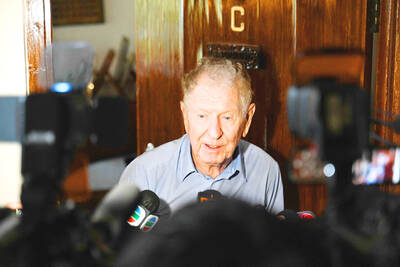Pope Benedict XVI faced growing Muslim anger yesterday over remarks in which he linked Islam with violence, with the Pakistani parliament calling on him to retract the statement.
In India, the head of the minorities commission said the pope sounded like a medieval crusader.
In a university lecture in Regensburg, Germany on Tuesday, the pope implicitly denounced connections between Islam and violence, particularly with regard to jihad, or "holy war."
The pope's official spokesman later issued a response saying that Benedict respected Islam but rejected violence motivated by religion.
Muslim leaders in several countries have strongly criticized the remarks.
Yesterday, the Pakistani parliament unanimously called on the pontiff to retract his remarks, while the foreign office accused him of "ignorance."
"This House demands that the pope should retract his remarks in the interest of harmony between religions," said the resolution passed by the overwhelmingly Muslim country's National Assembly.
"The derogatory remarks of the pope about the philosophy of jihad and Prophet Mohammed have injured sentiments across the Muslim world and pose the danger of spreading acrimony among the religions," the resolution said.

US PUBLICATION: The results indicated a change in attitude after a 2023 survey showed 55 percent supported full-scale war to achieve unification, the report said More than half of Chinese were against the use of force to unify with Taiwan under any circumstances, a survey conducted by the Atlanta, Georgia-based Carter Center and Emory University found. The survey results, which were released on Wednesday in a report titled “Sovereignty, Security, & US-China Relations: Chinese Public Opinion,” showed that 55.1 percent of respondents agreed or somewhat agreed that “the Taiwan problem should not be resolved using force under any circumstances,” while 24.5 percent “strongly” or “somewhat” disagreed with the statement. The results indicated a change in attitude after a survey published in “Assessing Public Support for (Non)Peaceful Unification

The CIA has a message for Chinese government officials worried about their place in Chinese President Xi Jinping’s (習近平) government: Come work with us. The agency released two Mandarin-language videos on social media on Thursday inviting disgruntled officials to contact the CIA. The recruitment videos posted on YouTube and X racked up more than 5 million views combined in their first day. The outreach comes as CIA Director John Ratcliffe has vowed to boost the agency’s use of intelligence from human sources and its focus on China, which has recently targeted US officials with its own espionage operations. The videos are “aimed at

‘MISGUIDED EDICT’: Two US representatives warned that Somalia’s passport move could result in severe retaliatory consequences and urged it to reverse its decision Minister of Foreign Affairs Lin Chia-lung (林佳龍) has ordered that a special project be launched to counter China’s “legal warfare” distorting UN Resolution 2758, a foreign affairs official said yesterday. Somalia’s Civil Aviation Authority on Wednesday cited UN Resolution 2758 and Mogadishu’s compliance with the “one China” principle as it banned people from entering or transiting in the African nation using Taiwanese passports or other Taiwanese travel documents. The International Air Transport Association’s system shows that Taiwanese passport holders cannot enter Somalia or transit there. The Ministry of Foreign Affairs (MOFA) protested the move and warned Taiwanese against traveling to Somalia or Somaliland

Four former Hong Kong opposition lawmakers jailed in the territory’s largest national security case were released yesterday after more than four years in prison, the first among dozens convicted last year to regain their freedom. Former legislators Claudia Mo (毛孟靜), Jeremy Tam (譚文豪), Kwok Ka-ki (郭家麒) and Gary Fan (范國威) were part of a group of 47 public figures — including some of Hong Kong’s best-known democracy advocates — who were charged with subversion in 2021 for holding an informal primary election. The case fell under a National Security Law imposed on the territory by Beijng, and drew international condemnation and warnings